Featured Posts

- Index of Psychological Studies of Presidents and Other Leaders Conducted at the Unit for the Study of Personality in Politics
- The Personality Profile of U.S. Supreme Court Associate Justice Brett Kavanaugh
- The Leadership Style of North Korean Leader Kim Jong-un
- North Korea Threat Assessment: The Psychological Profile of Kim Jong-un
- Russia Threat Assessment: Psychological Profile of Vladimir Putin
- The Personality Profile of 2016 Republican Presidential Candidate Donald Trump
- Donald Trump's Narcissism Is Not the Main Issue
- New Website on the Psychology of Politics
- Unit for the Study of Personality in Politics --- 'Media Tipsheet'
categories

- Afghanistan (228)
- Al Gore (2)
- Amy Klobuchar (4)
- Ayman al-Zawahiri (7)
- Barack Obama (60)
- Ben Carson (2)
- Bernie Sanders (7)
- Beto O'Rourke (3)
- Bill Clinton (4)
- Bob Dole (2)
- Campaign log (109)
- Chris Christie (2)
- Chuck Hagel (7)
- Criminal profiles (8)
- Dick Cheney (11)
- Domestic resistance movements (21)
- Donald Trump (31)
- Economy (33)
- Elizabeth Warren (4)
- Environment (24)
- George H. W. Bush (1)
- George W. Bush (21)
- Hillary Clinton (9)
- Immigration (39)
- Iran (43)
- Iraq (258)
- Jeb Bush (3)
- Joe Biden (13)
- John Edwards (2)
- John Kasich (2)
- John Kerry (1)
- John McCain (7)
- Kamala Harris (5)
- Kim Jong-il (3)
- Kim Jong-un (11)
- Law enforcement (25)
- Libya (18)
- Mahmoud Ahmadinejad (6)
- Marco Rubio (2)
- Michael Bloomberg (1)
- Michele Bachmann (173)
- Mike Pence (3)
- Military casualties (234)
- Missing person cases (37)
- Mitt Romney (13)
- Muqtada al-Sadr (10)
- Muslim Brotherhood (6)
- National security (16)
- Nelson Mandela (4)
- News (5)
- North Korea (36)
- Osama bin Laden (19)
- Pakistan (49)
- Personal log (25)
- Pete Buttigieg (4)
- Presidential candidates (19)
- Religious persecution (11)
- Rick Perry (3)
- Rick Santorum (2)
- Robert Mugabe (2)
- Rudy Giuliani (4)
- Russia (7)
- Sarah Palin (7)
- Scott Walker (2)
- Somalia (20)
- Supreme Court (4)
- Syria (5)
- Ted Cruz (4)
- Terrorism (65)
- Tim Pawlenty (8)
- Tom Horner (14)
- Tributes (40)
- Uncategorized (50)
- Vladimir Putin (4)
- Xi Jinping (2)
- Yemen (24)
Links

archives

- November 2021
- January 2021
- November 2020
- October 2020
- September 2020
- August 2020
- July 2020
- April 2020
- March 2020
- February 2020
- January 2020
- December 2019
- October 2019
- July 2019
- May 2019
- April 2019
- March 2019
- February 2019
- January 2019
- December 2018
- September 2018
- August 2018
- July 2018
- June 2018
- April 2018
- March 2018
- February 2018
- January 2018
- August 2017
- July 2017
- June 2017
- May 2017
- April 2017
- February 2017
- January 2017
- December 2016
- November 2016
- October 2016
- September 2016
- August 2016
- July 2016
- June 2016
- May 2016
- April 2016
- March 2016
- February 2016
- January 2016
- December 2015
- November 2015
- October 2015
- September 2015
- August 2015
- July 2015
- June 2015
- May 2015
- April 2015
- March 2015
- February 2015
- January 2015
- December 2014
- November 2014
- October 2014
- September 2014
- August 2014
- July 2014
- June 2014
- May 2014
- April 2014
- March 2014
- February 2014
- January 2014
- December 2013
- November 2013
- October 2013
- September 2013
- August 2013
- July 2013
- June 2013
- May 2013
- April 2013
- March 2013
- February 2013
- January 2013
- December 2012
- November 2012
- October 2012
- September 2012
- August 2012
- July 2012
- June 2012
- May 2012
- April 2012
- March 2012
- February 2012
- January 2012
- December 2011
- November 2011
- October 2011
- September 2011
- August 2011
- July 2011
- June 2011
- May 2011
- April 2011
- March 2011
- February 2011
- January 2011
- December 2010
- November 2010
- October 2010
- September 2010
- August 2010
- July 2010
- June 2010
- May 2010
- April 2010
- March 2010
- February 2010
- January 2010
- December 2009
- November 2009
- October 2009
- September 2009
- August 2009
- July 2009
- June 2009
- May 2009
- April 2009
- March 2009
- February 2009
- January 2009
- December 2008
- November 2008
- October 2008
- September 2008
- August 2008
- July 2008
meta

The Political Personality of Russian Federation President Vladimir Putin. Working Paper No. 1.1, Unit for the Study of Personality in Politics, January 2017. Abstract and link for full-text (36 pages; PDF) download at Digital Commons: http://digitalcommons.csbsju.edu/psychology_pubs/104/
The Personality Profile of Russian President Vladimir Vladimirovich Putin
(ВладиÌмир ВладиÌмирович ПуÌтин)
Aubrey Immelman
Unit for the Study of Personality in Politics
March 2014
A remotely conducted empirical psychological assessment of Russian leader Vladimir Putin is currently in progress, using the third edition of the Millon Inventory of Diagnostic Criteria (MIDC), which yields 34 normal and maladaptive personality classifications congruent with DSM–IV.
Informal observation suggests that Putin is a highly dominant leader. However, more systematic observation is required to establish whether he is an introvert or an extravert.
If Putin is a dominant introvert, which appears to be the case [confirmed 7/30/2014], the following personality-based leadership profile would apply:
In terms of Lloyd Etheredge’s (1978) fourfold typology of personality-based foreign policy role orientations, which locates policymakers on the dimensions of dominance–submission and introversion–extraversion, high-dominance introverts (in American politics, presidents such as Woodrow Wilson and Herbert Hoover) are quite willing to use military force, tending
to divide the world, in their thought, between the moral values they think it ought to exhibit and the forces opposed to this vision. They tend to have a strong, almost Manichean, moral component to their views. They tend to be described as stubborn and tenacious. They seek to reshape the world in accordance with their personal vision, and their foreign policies are often characterized by the tenaciousness with which they advance one central idea. … [These leaders] seem relatively preoccupied with themes of exclusion, the establishment of institutions or principles to keep potentially disruptive forces in check. (p. 449; italics in original)
Etheredge’s high-dominance introvert is similar in character to Margaret Hermann’s (1987) expansionist orientation to foreign affairs. These leaders have a view of the world as being “divided into ‘us’ and ‘them,’ †based on a belief system in which conflict is viewed as inherent in the international system. This world view prompts a personal political style characterized by a “wariness of others’ motives†and a directive, controlling interpersonal orientation, resulting in a foreign policy “focused on issues of security and status,†favoring “low-commitment actions†and espousing “short-term, immediate change in the international arena.†Expansionist leaders “are not averse to using the ‘enemy’ as a scapegoat†and their rhetoric often may be “hostile in tone†(pp. 168–169).
If, on the other hand, Putin turns out to be a dominant extravert [which is not the case; 7/30/2014 update], the following thumbnail sketch would apply:
High-dominance extraverts (such as U.S. presidents Theodore and Franklin Roosevelt, John F. Kennedy, and Lyndon Johnson) share high-dominance introverts’ tendency “to use military forceâ€
[b]ut in general … are more flexible and pragmatic, more varied in the wide range and scope of major foreign policy initiatives. … [In contrast to high-dominance introverts, they] want to lead rather than contain. They advocate change, seek to stir up things globally. … [and] are relatively more interested in inclusion [compared with high-dominance introverts, who favor exclusion], initiating programs and institutions for worldwide leadership and cooperative advance on a wide range of issues. (p. 449)
From the perspective of Hermann’s (1987) sixfold typology, the best fit for the high-dominance extravert is the active-independent orientation to foreign affairs. These leaders, though recognizing the importance of other countries, are self-reliant and prefer to participate in international affairs on their own terms and without engendering a dependent relationship with other countries (p. 168).
In terms of personal political style, they “[s]eek a variety of information before making a decision; examine carefully the possible consequences of alternatives under consideration for dealing with a problem; [and] cultivate relationships with a diverse group of nations†(Hermann, 1987, p. 169).
The foreign policy resulting from an active-independent orientation is generally “focused on economic and security issues.†These leaders’ behaviors are “usually positive in tone but involves little commitment†because they “shun commitments that limit maneuverability and … independence†(Hermann, 1987, p. 169).
In summary, preliminary findings [confirmed 7/30/2014] suggest that Putin is more of an expansionist than an active-independent leader.
References
Etheredge, L. S. (1978). Personality effects on American foreign policy, 1898–1968: A test of interpersonal generalization theory. American Political Science Review, 72, 434–451.
Hermann, M. G. (1987). Assessing the foreign policy role orientations of sub-Saharan African leaders. In S. G. Walker (Ed.), Role theory and foreign policy analysis (pp. 161–198). Durham, NC: Duke University Press.
———————————————————————————
April 25, 2014 Update: Pilot Study Completed
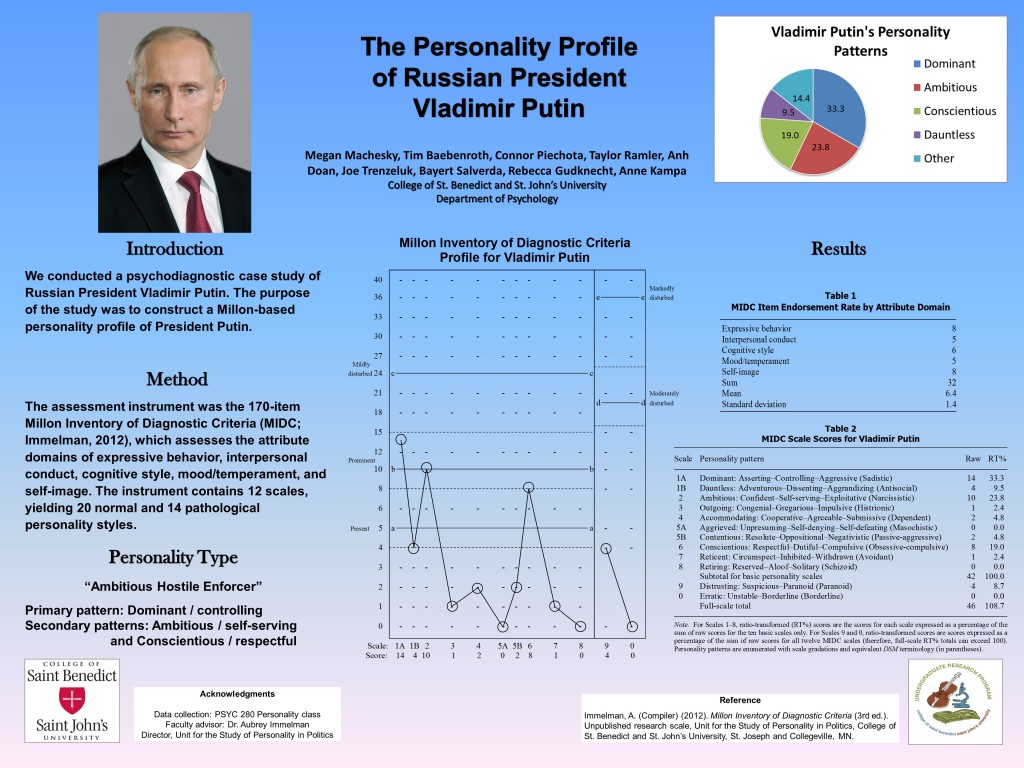
Click on image for larger view
——————————————————————————
July 30, 2014 Update:Â Full Study Completed
Following additional data collection by summer research fellow Joe Trenzeluk during the months of June and July, the psychological assessment of Russian leader Vladimir Putin has been completed. The next phase of the study, to be conducted during the month of August, will be to elaborate on Putin’s leadership style, employing his personality profile as a temporally and cross-situationally stable framework for anticipating his future political behavior.
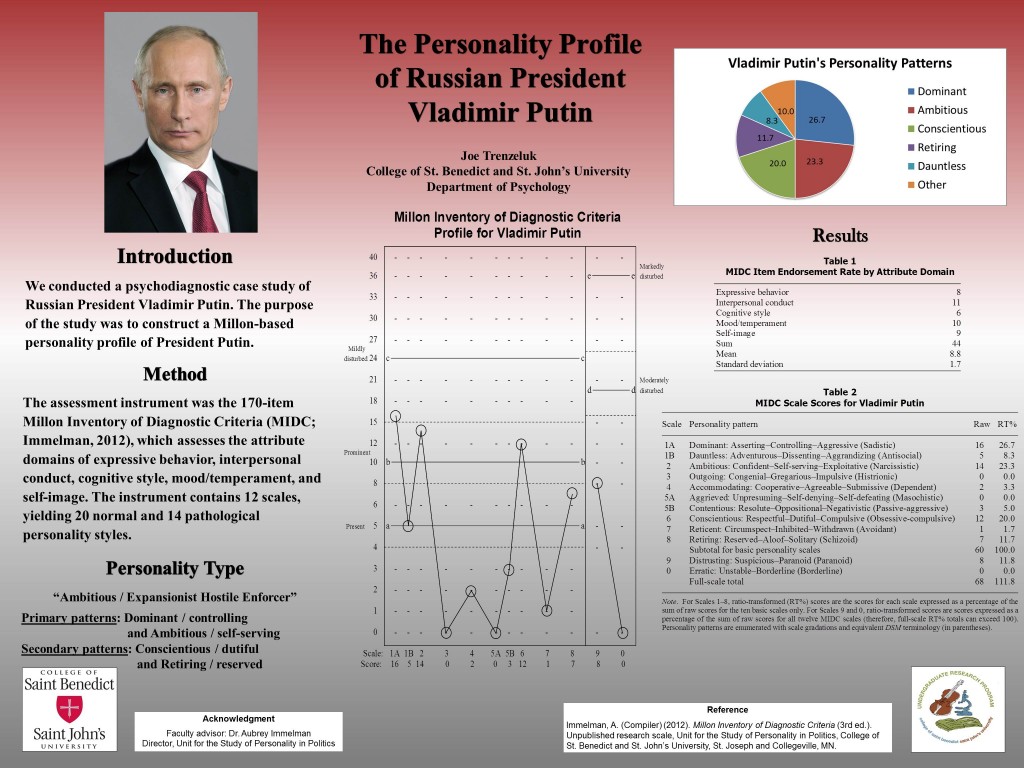
Click on image for larger view
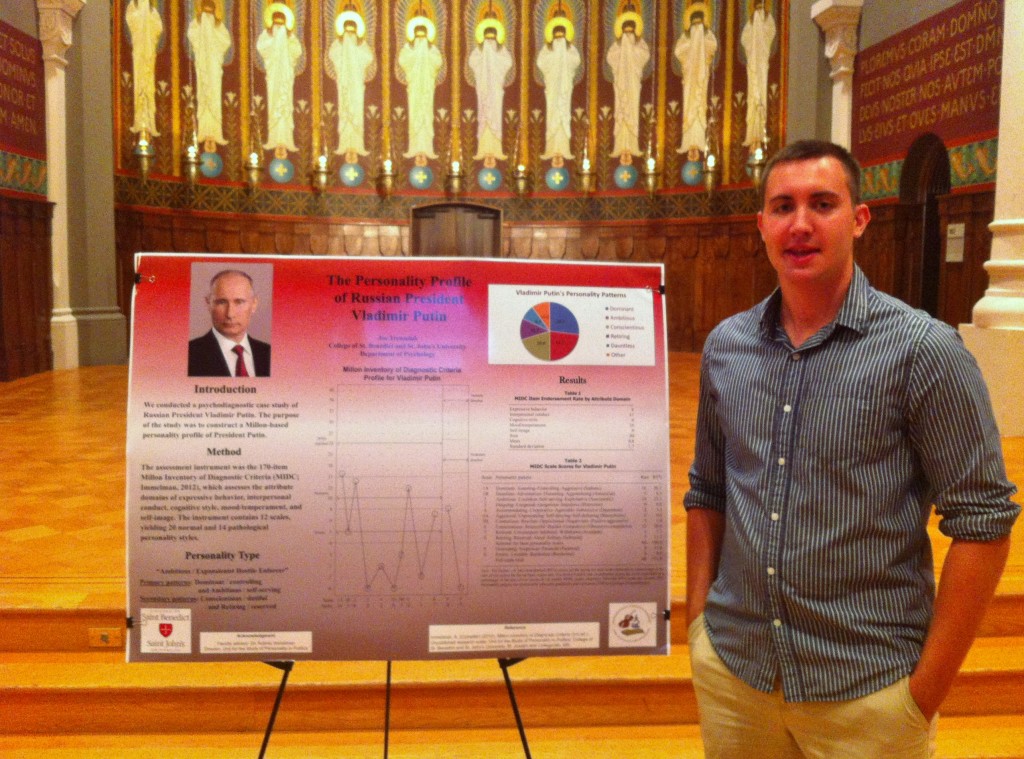
Joe Trenzeluk presents his research on “The personality profile of Russian president Vladimir Putin†at the Undergraduate Research Poster Session, Great Hall, St. John’s University, Collegeville, Minn., Aug. 6, 2014.
———————————————————————————
January 7, 2017 Update:Â Full Study Released
The Political Personality of Russian Federation President Vladimir Vladimirovich Putin
(Владимир Путин)
Aubrey Immelman and Joseph V. Trenzeluk
Unit for the Study of Personality in Politics
January 2017
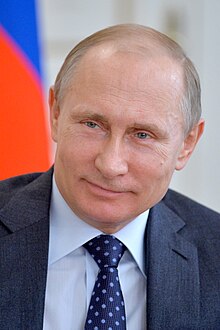
Abstract
This paper presents the results of an indirect assessment of the personality of Vladimir Putin, president of the Russian Federation, from the conceptual perspective of personologist Theodore Millon.
Psychodiagnostically relevant data regarding President Putin was extracted from open-source intelligence and synthesized into a personality profile using the Millon Inventory of Diagnostic Criteria (MIDC), which yields 34 normal and maladaptive personality classifications congruent with Axis II of DSM–IV.
The personality profile yielded by the MIDC was analyzed on the basis of interpretive guidelines provided in the MIDC and Millon Index of Personality Styles manuals. Putin’s primary personality patterns were found to be Dominant/controlling (a measure of aggression or hostility), Ambitious/self-serving (a measure of narcissism), and Conscientious/dutiful, with secondary Retiring/reserved (introverted) and Dauntless/adventurous (risk-taking) tendencies and lesser Distrusting/suspicious features. The blend of primary patterns in Putin’s profile constitutes a composite personality type aptly described as an expansionist hostile enforcer.
Dominant individuals enjoy the power to direct others and to evoke obedience and respect; they are tough and unsentimental and often make effective leaders. This personality pattern defines the “hostile†component of Putin’s personality composite.
Ambitious individuals are bold, competitive, and self-assured; they easily assume leadership roles, expect others to recognize their special qualities, and often act as though entitled. This personality pattern delineates the “expansionist†component of Putin’s personality composite.
Conscientious individuals are dutiful and diligent, with a strong work ethic and careful attention to detail; they are adept at crafting public policy but often lack the retail political skills required to consummate their policy objectives and are more technocratic than visionary. This personality pattern fashions the “enforcer†component of Putin’s personality composite.
Retiring (introverted) individuals tend not to develop strong ties to others, are somewhat deficient in the ability to recognize the needs or feelings of others, and may lack spontaneity and interpersonal vitality.
Dauntless individuals are adventurous, individualistic, daring personalities resistant to deterrence and inclined to take calculated risks.
Putin’s major personality-based strengths in a political role are his commanding demeanor and confident assertiveness. His major personality-based shortcomings are his uncompromising intransigence, lack of empathy and congeniality, and cognitive inflexibility.
Full-text download » http://digitalcommons.csbsju.edu/psychology_pubs/104/
—————————————————
Russia’s Military Capability
Comparing the Military Capability of Putin’s Russia With the Soviet Union’s
By Adam Taylor
![]()
March 27, 2014

Click for report full-scale graphics
—————————————————
July 2, 2014 — Related report
Putin Should Prepare Himself for Clinton
If Clinton Is Elected President, Russia’s Putin Will Be In for Rude Awakening
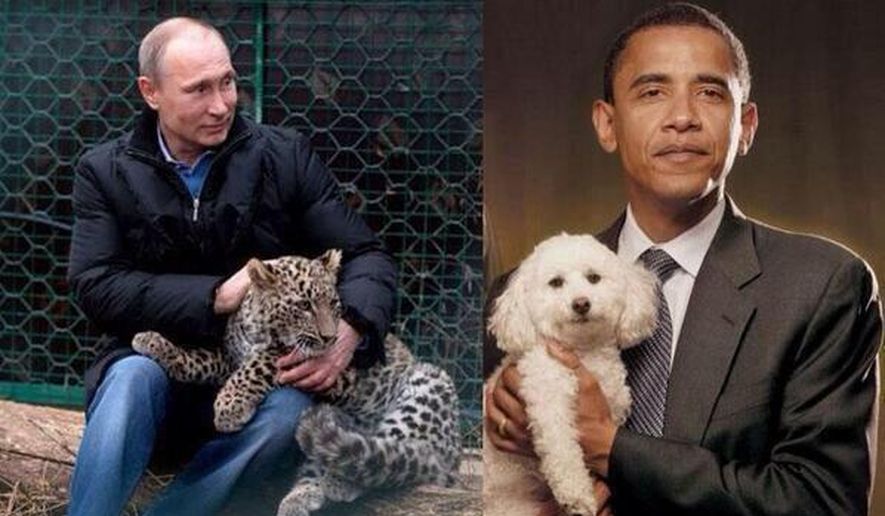
A July 31, 2014 tweet allegedly from the account of Dmitry Rogozin, deputy prime minister of Russia, ridiculed Obama by juxtaposing an image of the Russian president with a snow leopard and another of his American counterpart holding a puppy. (Image added; not part of St. Cloud Times article)
By Joe Trenzeluk
St. Cloud Times
June 28, 2014
The past few months have sparked heated debate regarding President Obama’s handling of foreign policy, specifically the crisis in Ukraine and his negotiations, or lack thereof, with Vladimir Putin.
Critics have accused Obama of appearing weak and passive, imposing feeble sanctions and essentially letting Putin’s expansionism go unchecked. From their perspective, Obama is not a president who adversaries fear, but a mere annoyance who the tough, Judo-champion, ex-KGB Russian president easily can swat aside.
This mismatch between the world’s two most powerful men (according to Forbes’ latest rankings) should come as no surprise. Studies of Obama’s personality conducted at the Unit for the Study of Personality in Politics show that, not unlike Putin and many other world leaders, Obama is an ambitious individual. However, the key difference between the personalities of Obama and Putin is an accommodating tendency on Obama’s part, in stark contrast to Putin’s strongly dominant personality pattern.
Accommodating leaders like Obama have a strong preference for negotiation over force.
Hard-nosed Putin
Although this predisposition can be a net positive under some situations, when dealing with hard-nosed individuals such as Putin, it can spell trouble. The ambitious, controlling, opportunistic Putin is sure to take advantage of Obama’s accommodating nature.
Political-psychological studies suggest that putative 2016 presidential candidate Hillary Rodham Clinton may be better suited than Obama to deal with Putin.
Comparing Clinton and Obama head-to-head, it is evident both are highly ambitious. However, where Obama is accommodating, Clinton is highly dominant.
The political implication of this personality difference is that Clinton would likely deal with Putin from a position of strength and articulate her position bluntly and with clarity, while refusing to let Putin outmaneuver her.
Granted, one could argue Clinton’s personal style — specifically her tendency to be assertively uncompromising — would run the risk of adding fuel to the fire, escalating the standoff with Russia over its annexation of Crimea.
Hardball Hillary
In reality, however, Clinton’s psychological profile underscores that she is a dutiful individual who would exercise due diligence in dealing with Putin and proceed prudently when playing hardball politics.
Putin, whose personality profile reveals a thin-skinned person who handles criticism poorly and becomes defensive, would be thrown off balance by the direct confrontation on which Clinton thrives.
Significant personality contrasts between Obama and Clinton offer insight into the political implications of their respective personal political styles. The politics of conciliation characteristic of Obama will likely wane in the next administration. Having been accustomed to the relative ease of dealing with the more conflict-averse Obama for the better part of a decade, Putin will be in for a rude awakening if Clinton is to hold the reins of power in the post-Obama era.
This is the opinion of Joe Trenzeluk, Inver Grove Heights, a junior psychology major at the College of St. Benedict and St. John’s University, where he is a summer research fellow in the Unit for the Study of Personality in Politics, directed by Aubrey Immelman.
———————————————————
August 4, 2014 — Related report
Profile Hints at Putin Mindset
Russian president’s ambitious nature means he’ll never let West get ahead of him
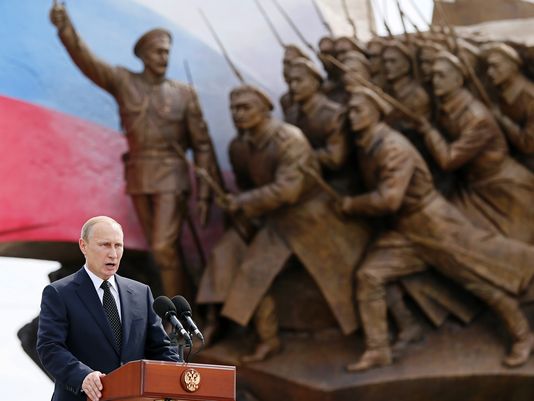
Russian President Vladimir Putin speaks Friday, Aug. 1, 2014 at the opening ceremony of the monument to the Heroes of World War I, behind him, on the day of the 100th anniversary of its beginning in Victory Park on Poklonnaya Hill in Moscow, Russia. (Photo credit: AP via St. Cloud Times)
By Joe Trenzeluk
St. Cloud Times
August 3, 2014
On July 17, 298 innocent victims were killed when Malaysia Airlines Flight MH17 was shot down over Ukraine. As attempts to investigate the incident continue, international pressure has been placed on Russian President Vladimir Putin because it is believed the Russian military supplied Ukrainian pro-Russia separatists with the Buk surface-to-air missiles that downed the airliner.
Putin issued a statement that Russia will do “everything in its power†to assist with the investigation and offered his condolences to people who lost loved ones in the tragedy.
If Putin’s role in the current crisis in Ukraine, his relations with the Syrian regime and pro-Assad Iran, and ongoing reports of human rights violations in Russia are not enough to call into question Putin’s character and leadership qualities, the downing of Flight MH17 certainly has.
Empirical analysis of Putin’s personality at the College of St. Benedict and St. John’s University’s Unit for the Study of Personality in Politics reveals that Putin is a highly dominant, narcissistic leader with secondary features of high conscientiousness and substantial introversion.
In a nutshell, leaders of this kind may be labeled “ambitious (or expansionist) hostile enforcers.â€
Identifying the personality configuration of political leaders matters because personality points to stable, enduring patterns in a person’s motives, thoughts, and actions over time and across situations. Thus, accurate personality assessment allows us to anticipate a leader’s response to a broad range of contingencies.
Expansionist leader
In terms of foreign policy role orientation, the “high-dominance introvert†facet of Putin’s personality parallels what political psychologist Margaret Hermann has labeled an expansionist leader. Expansionists, like Adolf Hitler or Saddam Hussein, see the world as being “divided into ‘us’ and ‘them,’ †based on a belief system in which conflict is viewed as inherent in the international system.
This worldview prompts a personal political style characterized by a “wariness of others’ motives†and a directive, controlling interpersonal orientation, resulting in a foreign policy “focused on issues of security and status,†favoring “low-commitment actions†and espousing “short-term, immediate change in the international arena.â€
Expansionist leaders, according to Hermann, “are not averse to using the ‘enemy’ as a scapegoat,†and their rhetoric often may be “hostile in tone.â€
Other common characteristics of expansionists include a high degree of power motivation, strong nationalism, an unwavering belief in one’s ability to control events, supreme self-confidence, distrust of others, and a very goal-directed level of task orientation — all of which are evident to varying degrees in Putin’s personality profile.
Putin is Russia
Putin believes the world is divided between his Russia and the West, often using “the West†or “democracy†as a scapegoat for his problems. Rising through the KGB and Russia’s political elite, he entwined himself with the history of Russia. Typical of narcissistic leaders with exalted self-concept and dreams of glory, he views his destiny and that of the Russian state as one and the same. Putin is Russia; Russia is Putin.
Although Putin shows no discernible signs of contemplating genocide or waging conventional war — sensation-seeking adventurousness ranks relatively low in his overall personality profile — he displays a desire for control and deeply entrenched feelings of resentment toward the West.
His world is a zero-sum game in which any gains by the West or by domestic opponents are considered moral threats to his power.
This is the opinion of Joe Trenzeluk, Inver Grove Heights, a junior psychology major at the College of St. Benedict and St. John’s University, where he is a summer research fellow in the Unit for the Study of Personality in Politics, directed by Aubrey Immelman.
—————————————————————
February 15, 2015 — Related report
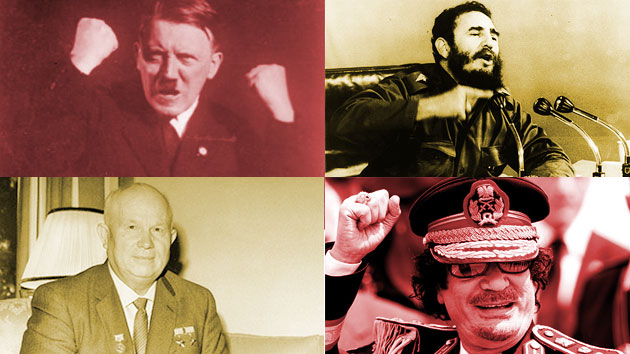
The CIA’s secret psychological profiles of dictators and world leaders are amazing: Psychoanalyzing strongmen, from Castro to Saddam (Dave Gilson, Mother Jones, Feb. 11, 2015) — Last week, Politico and USA Today reported about a secret 2008 Pentagon study which concluded that Russian President Vladimir Putin’s defining characteristic is … autism. The Office of Net Assessment’s Body Leads project asserted that scrutinizing hours of Putin footage revealed “that the Russian President carries a neurological abnormality … identified by leading neuroscientists as Asperger’s Syndrome, an autistic disorder which affects all of his decisions.” Putin’s spokesman dismissed the claim as “stupidity not worthy of comment.” But it was far from the first time the intelligence community has tried to diagnose foreign leaders from afar on behalf of American politicians and diplomats. The CIA has a long history of crafting psychological and political profiles of international figures, with varying degrees of depth and accuracy. … Full story
![]() Video — Pentagon Study: Putin May Have Asperger’s (“The Last Word with Lawrence O’Donnell,” MSNBC, February 5, 2015) — A newly released 2008 Pentagon think tank study theorizes that Russian President Vladimir Putin’s decision making may be affected by Asperger’s Syndrome. Lawrence O’Donnell talks to Adrian Karatnycky of the Atlantic Council and Clinical Professor of Psychiatry Dr. Justin Frank of the George Washington University Medical Center. (4:42)
Video — Pentagon Study: Putin May Have Asperger’s (“The Last Word with Lawrence O’Donnell,” MSNBC, February 5, 2015) — A newly released 2008 Pentagon think tank study theorizes that Russian President Vladimir Putin’s decision making may be affected by Asperger’s Syndrome. Lawrence O’Donnell talks to Adrian Karatnycky of the Atlantic Council and Clinical Professor of Psychiatry Dr. Justin Frank of the George Washington University Medical Center. (4:42)
———————————————
March 15, 2015 — Sidebar
Putin Has Vanished, but Rumors Are Popping Up Everywhere (Neil MacFarquhar, New York Times, March 13, 2015) — “The rumor mill went into overdrive, churning out possible explanations from the simple to the salacious to the sinister. He had been stricken by the particularly devastating strain of flu going around Moscow just now. He sneaked off to Switzerland for the birth of his love child. He had a stroke. The victim of a palace coup, he was imprisoned within the Kremlin. He was dead, aged 62. … But there seemed to be a certain reluctance to admit that Russia’s leader, who cultivates a macho image of ruddy good health, might have been felled like a mere mortal. …”
——————————————————
May 19, 2016 — Related report
Nick Hayes: ‘Putin’s Power Game at Home and Abroad’

Nick Hayes (Photo credit: CSB/SJU)
Minnesota Public Radio
May 18, 2016
Minnesota’s preeminent Russia expert, Nick Hayes [link added], gives a complex portrayal of Vladimir Putin, a man who sees himself as the leader who has given Russia a place at the table for international diplomacy.
Hayes is professor of history and holds the university chair in critical thinking [link added] at St. John’s University and the College of St. Benedict [link added]. He spoke May 6, 2016 at the Selim Center at the University of St. Thomas.
Listen to MPR Presents podcast
————————————————————
March 28, 2018 — Related report
How Russia’s History Informs Its Present and Future
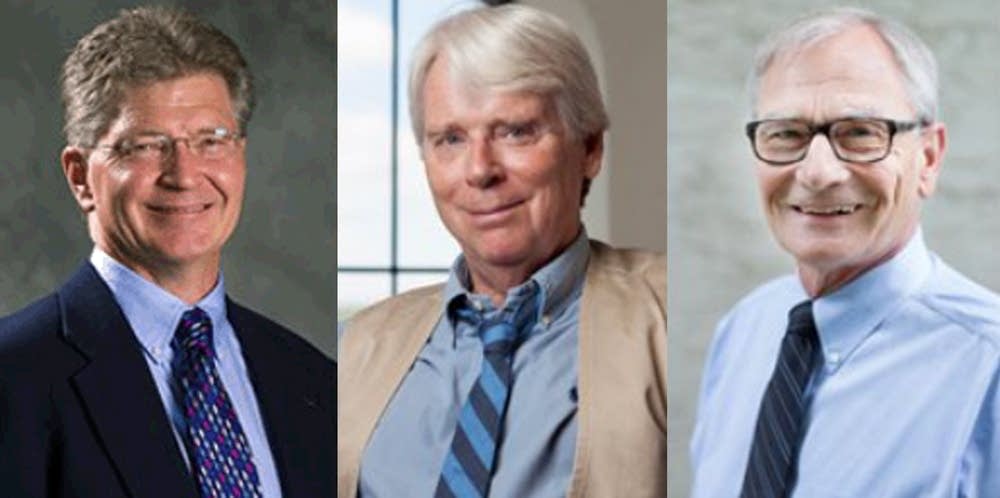
(From left) Michael Hemesath, Nick Hayes and Gary Eichten recently discussed the legacy of the Russian Revolution and its impact on Russia’s role in the world today. (Photo: St. John’s University via MPR)
Minnesota Public Radio
March 28, 2018
Excerpts
Two Russia experts from St. John’s University explore what have we learned about politics, economics and history in light of the Soviet experiment, and discuss Russia’s role in the world today. …
Professor Hayes said Vladimir Putin “enjoys a strong popularity in Russian society, and we have to come to grips with it.” Hayes believes Putin would have been resoundingly re-elected even without holding an election that most have said was only cosmetically democratic. …
Michael Hemesath discussed Russia’s economic past and future, and said Russia has “wasted” twenty years. Russia is “an important big middle income ecoonomy, but I don’t see them being a world power going forward, and their ‘playing footsie’ with China isn’t going to change that,” he said.
Nick Hayes is University Chair of Critical Thinking at St. John’s University and is writing a book about his many visits to Russia and how it has changed over the years.
Michael Hemesath is president of St. John’s University. A Harvard-trained economist, he has directed study-abroad programs in Russia and Ukraine.
Gary Eichten moderated the event held March 26, 2018 at the Museum of Russian Art in Minneapolis. He was a longtime host at Minnesota Public Radio and retired in 2012.
Listen to the discussion (54:45)
————————————————
Topical reports on this site
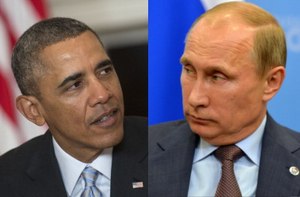
Barack Obama’s Presidential Leadership Style (Sept. 8, 2012)
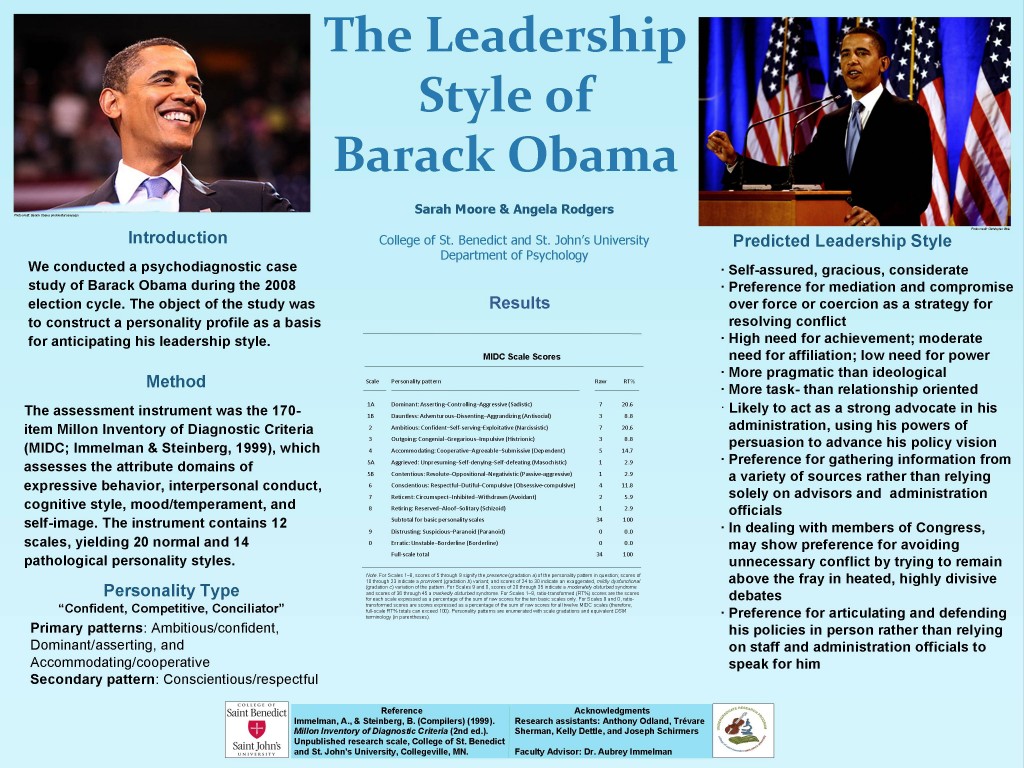
Click on image for larger view
A psychological profile of U.S. President Barack Obama, developed at the Unit for the Study of Personality in Politics during Obama’s 2008 and 2012 presidential campaigns, reveals that the president is a highly confident, moderately accommodating and deliberative, somewhat reserved personality type best described as a confident conciliator.

Click on image for larger display
As shown in the pie chart above, Obama is primarily an Ambitious/confident personality, complemented by secondary Accommodating/cooperative, Conscientious/respectful, and Retiring/reserved features.
A Key to Success for Obama? (March 17, 2009)
Barack Obama’s Leadership Style (Feb. 21, 2009)
Barack Obama’s Decision-Making Style (Nov. 25, 2008)
Barack Obama’s Personality Profile (Nov. 2, 2008)
The Political Personality of U.S. President Barack Obama
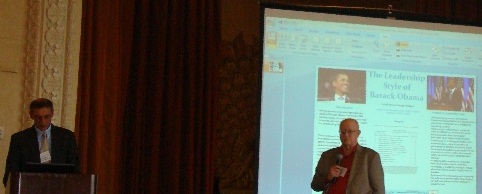
Presenter Aubrey Immelman and discussant Peter Suedfeld (Photo: Irina Rogozar-Kolpakova)
The Political Personality of U.S. President Barack Obama. Paper presented at the 33rd Annual Scientific Meeting of the International Society of Political Psychology, San Francisco, CA, July 7–10, 2010. Abstract and link for full-text (19 pages; PDF) download at Digital Commons: http://digitalcommons.csbsju.edu/psychology_pubs/25/
Leave a Reply
You must be logged in to post a comment.


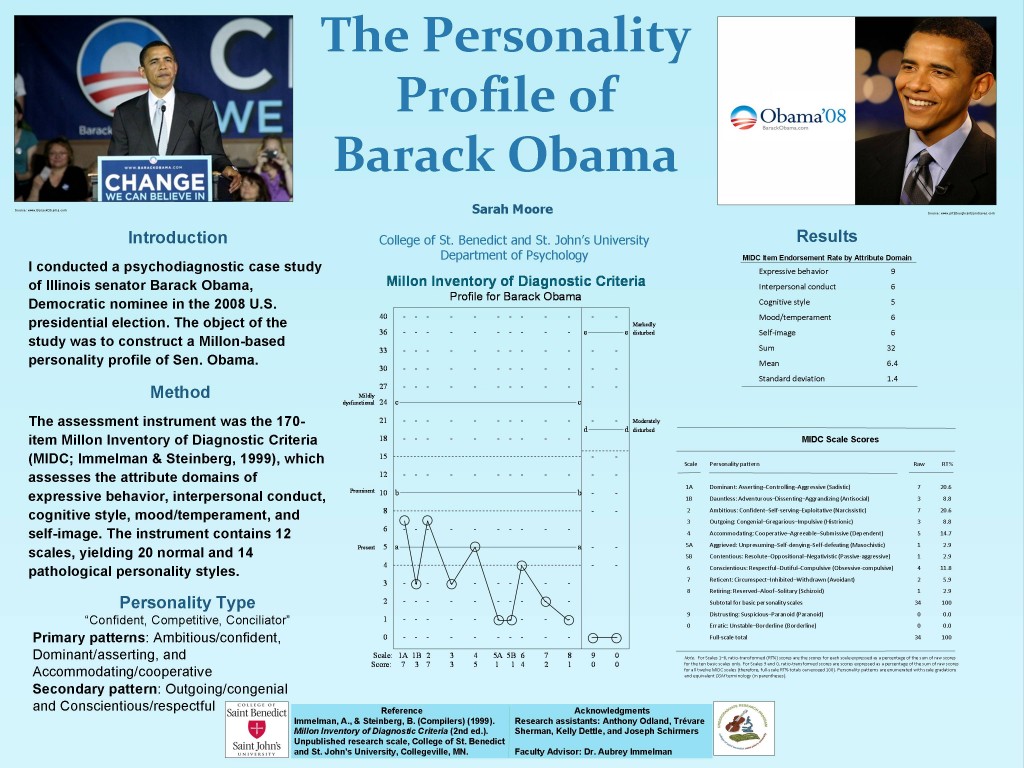

February 20th, 2017 at 9:44 am
[…] Russia Threat Assessment: Psychological Profile of Vladimir Putin […]
June 20th, 2017 at 5:04 am
Trump’s new Russia expert wrote a psychological profile of Vladimir Putin — and it should scare Trump (Review of “Mr. Putin: Operative in the Kremlin” by Fiona Hill and Clifford G. Gaddy) by Carlos Lozada, Washington Post, March 31, 2017 » https://www.washingtonpost.com/news/book-party/wp/2017/03/31/trumps-new-russia-expert-wrote-a-psychological-profile-of-vladimir-putin-and-it-should-scare-trump/
Excerpt: Fiona Hill, the incoming senior director for Russia and Europe on President Trump’s National Security Council staff, is the co-author of “Mr. Putin: Operative in the Kremlin,” essentially a 500-page psychological profile of the Russian leader, from his early KGB years through his rise and rule at the Kremlin. … First published in 2013 and updated in 2015, the book breaks down Putin’s overlapping personas, showing how they shape his dominance at home and rivalries abroad. Hill and co-author Clifford G. Gaddy of the Brookings Institution list six identities that they think make up Putin’s “mental outlook, his worldview” — the Statist, the History Man, the Survivalist, the Outsider, the Free Marketeer and the Case Officer.
July 15th, 2018 at 1:50 pm
[…] Russia Threat Assessment: Psychological Profile of Vladimir Putin […]